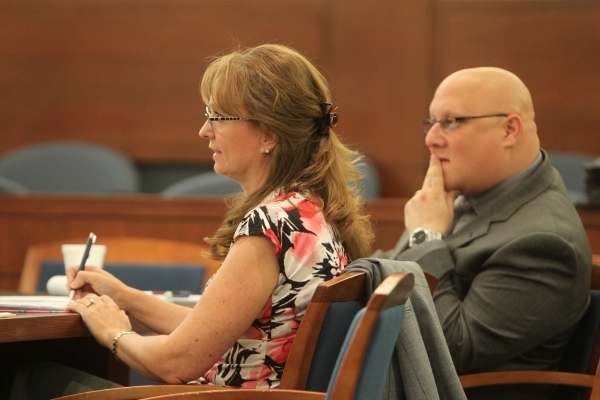Ramsey recall would make history
Following a series of highly criticized actions, including allegations that she dismissed cases out of spite for the city attorney and put her personal legal expenses on a city purchasing card, North Las Vegas Municipal Judge Catherine Ramsey is set to face a recall vote. Petitioners handed in more than the 1,984 valid signatures needed to put her on a recall ballot. If the Nevada Supreme Court gives the recall a green light, Ramsey‘s opponents will have achieved an impressive result -- not only would Ramsey become the first judge in Nevada‘s history to face a recall vote, she likely would be the first American judge to face a recall election in more than 30 years.
This long stretch without a judicial recall election is not for lack of trying. In Orange County, Calif., petitioners are trying to recall Judge M. Marc Kelly over what opponents have called an overly lenient sentence to a convicted sex offender. Over the years, plenty of judges have had recalls brought against them for a variety of reasons, from awarding O.J. Simpson custody of his children to ruling that California‘s domestic partnership law did not violate the Defense of Marriage Act. But none of these recalls have collected enough signatures to trigger an election.
The last recalls of judges that we know of -- records on recalls are spotty -- took place in Wisconsin. In 1977, Judge Archie Simonson was tossed out by voters after handing down an extremely lenient sentence for a rapist and making negative comments about women and rape victims from the bench. Then, in 1982, Judge William Reinecke survived a recall vote after making wildly offensive comments about a 5-year-old sexual assault victim.
There are other famous electoral ousters of judges that are mistakenly called recalls. In 1985, California Chief Justice Rose Bird was thrown out, along with two associate justices, in mandatory retention elections. In 2010, three Iowa Supreme Court justices were ousted over their votes in favor of same-sex marriage. But these retention election losses show just how hard it is to recall a judge -- retention votes are mandatory and don’t require opponents to collect a mountain of signatures. In fact, Bird faced nine recall attempts, none of which went anywhere.
Ramsey may look at voters traditional reluctance to recall judges and have some hope of survival. This hesitance of subjecting judges to recalls dates to the modern-day origins of the device. As Ramsey may argue before the Supreme Court, there was a concern that putting judges under what President William Howard Taft called the "hair-trigger form of government" would result in misguided rulings and gun-shy jurists. Taft actually vetoed the Arizona Constitution over a provision allowing the recall of judges, and debate over the subject drove a wedge between Taft and his predecessor, Teddy Roosevelt, helping elect Woodrow Wilson president in 1912. California saw this fight play out during its recall adoption debates in 1911. The provision allowing the recall of judges was in great danger, but a fortuitously timed California Supreme Court scandal saved the day.
But Ramsey shouldn‘t take too much solace in this history. She has argued that judges can‘t be recalled. They certainly can be in other states. And, in reality, the philosophical arguments of yesteryear have nothing to do with why recalls of judges usually fail. Getting any recall to a vote is extremely hard work and requires money and motivated volunteers. Removing a lower-court judge, unlike a politician, results in almost no policy changes. Many of these positions also require tens of thousands of signatures; in the Orange County recall attempt, for example, the petitioners need more than 90,000 signatures to get it to the ballot. But for the recall of Ramsey, these hurdles have already been overcome.
Ramsey may have other potential avenues for appeal -- specifically, she is complaining that the random sampling method of checking signatures doesn’t pass constitutional muster. Although this method has been upheld elsewhere, it is conceivable that the Nevada Supreme Court could take a different position. But since that position has already been rejected at the District Court level, Ramsey shouldn’t hold her breath. Instead, she may have to consider a starker reality: Over the last four years, more than half of elected officials who faced a recall election were removed from office.
Ramsey would stand out among her recently recalled peers -- she‘d be the only wearing a robe.
Joshua Spivak is a senior fellow at the Hugh L. Carey Institute for Government Reform at Wagner College in New York. He blogs at http://recallelections.blogspot.com.

















